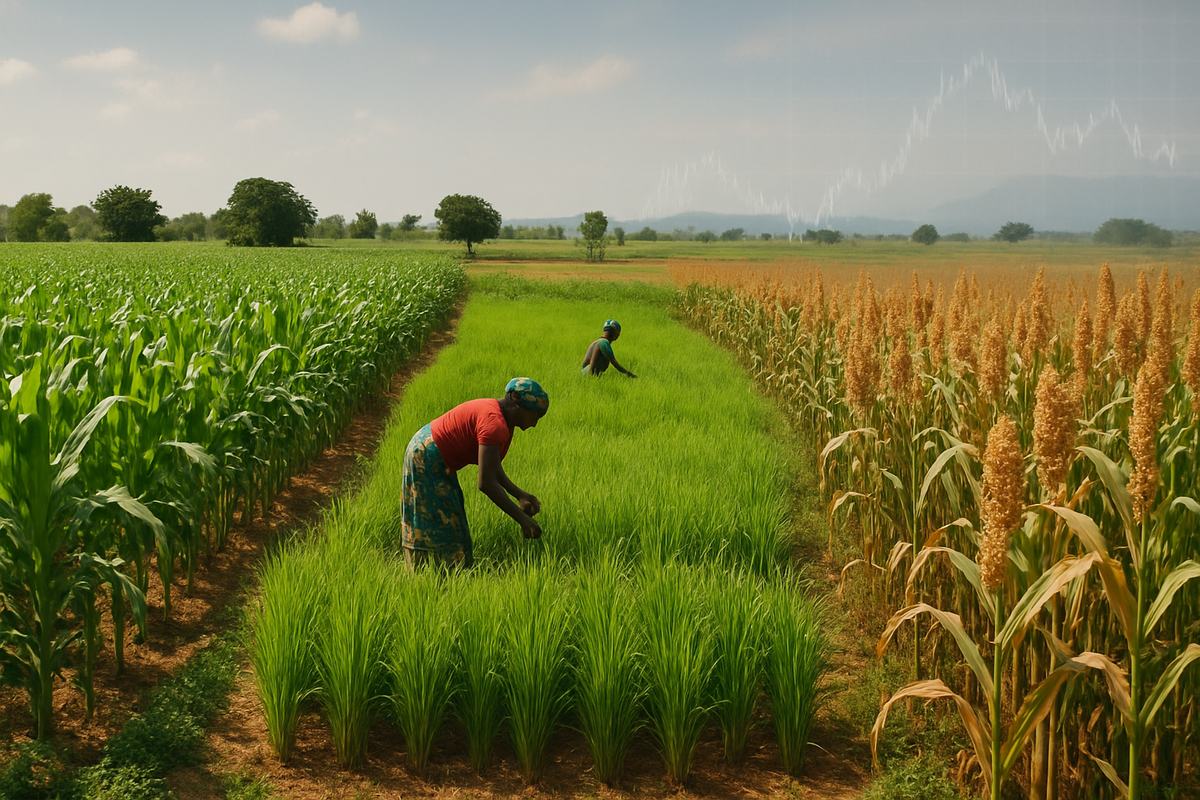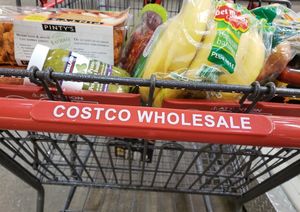
Nigeria's agricultural sector is at a critical juncture, with the Federal Government optimistically forecasting increased food output and a subsequent reduction in market prices for the 2025 wet season. This projection, championed by the Minister of Agriculture and Food Security, Senator Abubakar Kyari, paints a hopeful picture of enhanced food security and relief for consumers. However, this official optimism clashes sharply with independent market analyses that predict a "historic surge" in food commodity prices, highlighting a persistent disconnect between policy aspirations and on-the-ground economic realities.
The divergence in these outlooks creates significant uncertainty for millions of Nigerians, who are already grappling with high inflation and economic hardship. While a bumper harvest could indeed bring down the cost of staples, a failure to address underlying challenges could exacerbate food insecurity and further strain household budgets, making the 2025 agricultural season a pivotal moment for the nation's economic stability.
Conflicting Visions: Government Optimism Meets Market Skepticism
The Federal Government's upbeat assessment stems from the 2025 Agricultural Performance Survey (APS), which, according to Minister Kyari, indicates "encouraging growth in major staples" such as a 2.66% increase in rice production and a 2.0% rise in maize output. The Minister also lauded the successful cultivation of climate-resilient rainfed wheat varieties in highland areas, a development he believes will significantly reduce Nigeria's reliance on wheat imports. This positive sentiment is further bolstered by the government's assertion of a "welcome decline in food prices" based on the APS findings, offering a glimmer of hope to a populace beleaguered by escalating living costs.
To achieve these ambitious targets, the government has rolled out a comprehensive suite of initiatives. These include a renewed focus on agricultural mechanization, with over 2,000 tractors and combined harvesters deployed under the "Renewed Hope Mechanisation Initiative." Significant investments are also being directed towards irrigation development to enable year-round farming, alongside intensified support for local fertilizer production and the recruitment of more agricultural extension workers. Other key programs encompass climate-smart agriculture, robust post-harvest management through the upcoming Nigeria Postharvest Systems Transformation Program (NiPHaST), affordable financing via the recapitalized Bank of Agriculture (BoA), and strategic engagement of youth and women in farming. The Defence Farms Scheme, involving the military in cultivation, also underscores the multi-faceted approach.
Despite the government's proactive measures, independent market analysts, notably the African Exchange (AFEX), present a far more sobering forecast. AFEX's 2025 Annual Commodities Outlook Report projects a "historic surge in food prices" for the year. Their analysis anticipates a 48% increase in maize prices, a staggering 95% rise for soybeans, a 55% jump for paddy rice, and an alarming 102% surge for sorghum. These projections are attributed to a confluence of factors including reduced domestic production levels, growing international demand, and persistent increases in logistics costs due to fuel price hikes. The 2025 APS itself, while highlighting growth, concurrently revealed significant challenges on the ground, such as erratic rainfall, widespread pest infestations causing an estimated 22.5% yield loss in affected areas, and surging input costs, with NPK fertilizer prices increasing by 19.5% and urea by 10.1%, making affordability a major hurdle for smallholder farmers.
Key stakeholders in this complex agricultural landscape include the Federal Ministry of Agriculture and Food Security (FMAFS), various state ministries, the Nigerian Meteorological Agency (NiMet), the Central Bank of Nigeria (CBN), the Bank of Agriculture (BoA), numerous research and academic institutions, private sector agribusinesses, farmers' organizations, and international development partners. The divergent views among these groups underscore the challenges in accurately predicting and managing Nigeria's food economy.
Market Movers: Who Wins and Who Loses?
The contrasting forecasts for Nigeria's 2025 agricultural season present a mixed bag of fortunes for various public and private entities operating within the food value chain. If the Minister's optimistic outlook of increased output and lower prices materializes, food processing companies such as Dangote Sugar Refinery Plc (NGX: DANGSUGAR) and Flour Mills of Nigeria Plc (NGX: FLOURMILL) could see a significant reduction in raw material costs. This would improve their profit margins, potentially leading to lower consumer prices for their finished products and increased sales volumes. Similarly, agricultural input suppliers and mechanization service providers stand to gain from government initiatives and increased farming activities, although the affordability of inputs remains a critical concern for farmers.
Conversely, if AFEX's projections of soaring commodity prices prove accurate, the impact could be severe. Food processing companies would face immense pressure on their input costs, potentially forcing them to either absorb higher expenses, thus eroding profits, or pass them on to consumers, further fueling inflation. Agricultural export companies might benefit from higher global prices for certain commodities, but domestic food security concerns could lead to export restrictions, limiting their upside. Farmers, despite potentially receiving higher prices for their produce, might still struggle with profitability due to the exorbitant cost of fertilizers, seeds, and fuel, as highlighted by the APS.
Furthermore, companies involved in logistics and transportation could see increased activity if agricultural output rises, but they also face the challenge of high fuel costs, which could negate some of their gains. Financial institutions like the Bank of Agriculture (BoA), if effectively recapitalized and managed, could play a crucial role in supporting farmers with affordable credit, thereby contributing to increased production. However, widespread loan defaults, should harvests fail or prices remain low for farmers, could pose a risk. The interplay of government policy, market dynamics, and climatic factors will ultimately determine the winners and losers in this high-stakes agricultural season.
Wider Implications: A Test of Resilience and Policy Effectiveness
Nigeria's agricultural outlook for 2025 is more than just a matter of harvest yields; it is a critical barometer for the nation's economic resilience, food security, and the effectiveness of its agricultural policies. The persistent struggle between government aspirations and market realities reflects broader industry trends, particularly the challenges faced by developing economies in achieving self-sufficiency in food production amidst climate change, insecurity, and global economic volatility. This event fits into a long-standing pattern of Nigeria's efforts to diversify its economy away from oil, with agriculture being a cornerstone of this strategy.
The potential ripple effects extend beyond Nigeria's borders. As a regional economic powerhouse, Nigeria's agricultural performance significantly influences food commodity prices and supply chains across West Africa. A successful season could stabilize regional food markets, while a shortfall could trigger price hikes and increased food insecurity in neighboring countries that rely on Nigerian produce or are affected by its import demands. This scenario also has implications for international trade, potentially altering Nigeria's import bills for staples like wheat and rice.
Regulatory and policy implications are profound. The government's numerous initiatives, from mechanization to irrigation and input support, represent substantial investments. The success or failure of these programs in bridging the gap between projected output and actual market prices will be a crucial test of policy implementation. It could necessitate strategic pivots, such as a re-evaluation of subsidy programs to ensure affordability and accessibility of inputs for smallholder farmers, and a stronger focus on addressing insecurity in farming communities. Historically, Nigeria has faced similar challenges, with past agricultural interventions often yielding mixed results due to issues like corruption, poor infrastructure, and inadequate data. The 2025 season will serve as a fresh benchmark against these historical precedents.
The Road Ahead: Navigating Uncertainty
Looking ahead, the short-term trajectory of Nigeria's food market will likely be characterized by continued volatility, driven by the interplay of actual harvest outcomes, government interventions, and global commodity price movements. If the wet season harvest aligns with the Minister's optimistic forecast, consumers could experience some relief from high food prices in the immediate future, potentially easing inflationary pressures. However, if AFEX's dire predictions of price surges materialize, the government will face immense pressure to stabilize markets through strategic reserves, targeted subsidies, or import adjustments.
In the long term, Nigeria's agricultural sector requires sustained strategic pivots and adaptations. There is a critical need to move beyond seasonal interventions towards a holistic approach that addresses fundamental challenges such as inadequate storage and processing facilities, which contribute to significant post-harvest losses (estimated at N3.5 trillion annually). Investment in robust agricultural infrastructure, including rural roads and efficient logistics networks, is paramount to ensure that produce reaches markets efficiently and at reasonable costs. Furthermore, enhancing climate resilience through widespread adoption of drought-resistant crops and advanced irrigation techniques will be crucial in mitigating the impacts of erratic weather patterns.
Market opportunities may emerge for agri-tech startups offering innovative solutions in areas like precision farming, supply chain management, and financial inclusion for farmers. However, challenges such as limited access to capital for these ventures and the need for a supportive regulatory environment remain. Potential scenarios range from a gradual stabilization of food prices and improved food security if government policies prove effective and climate conditions are favorable, to a worsening food crisis if underlying issues persist and market forces dictate higher prices. Investors should closely monitor the effectiveness of government agricultural programs, the stability of commodity prices, and the impact of climate events on harvests.
A Crucial Juncture for Nigeria's Food Future
In summary, Nigeria's agricultural outlook for 2025 presents a complex narrative of hope and apprehension. While the Federal Government projects increased food output and a welcome decline in market prices, independent market analyses forecast a significant surge in food commodity prices. This divergence underscores the critical need for transparent data, effective policy implementation, and a concerted effort to bridge the gap between policy objectives and on-the-ground realities. The success of government initiatives in areas like mechanization, irrigation, and input support will be pivotal in determining the actual outcomes for farmers, consumers, and the broader economy.
Moving forward, the market will be keenly watching for signs of genuine impact from government programs, particularly regarding the affordability of agricultural inputs and the effective management of post-harvest losses. Investors should pay close attention to commodity price trends, the government's fiscal commitment to the agricultural sector, and any shifts in climate patterns that could affect yields. The 2025 wet season is not merely about a single harvest; it is a crucial test of Nigeria's resolve and capacity to achieve sustainable food security and economic stability. The lasting impact of this period will shape the trajectory of Nigeria's agricultural sector for years to come.
This content is intended for informational purposes only and is not financial advice






